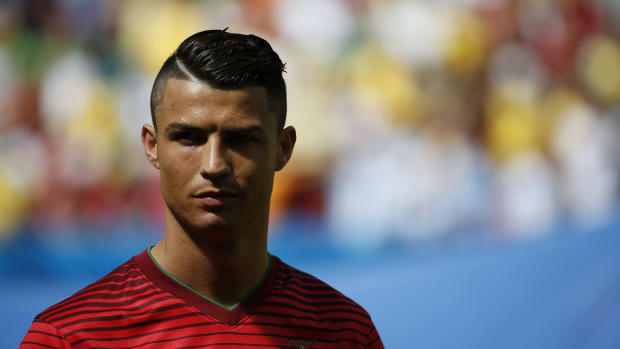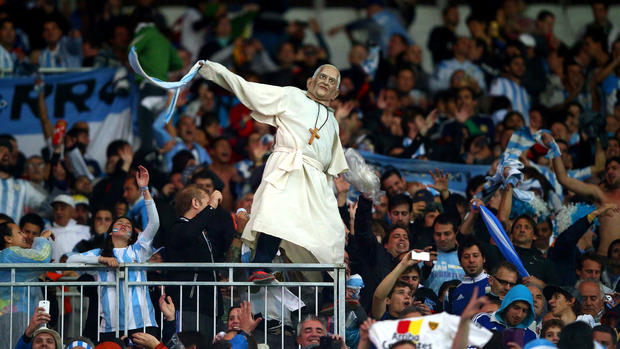World Cup 2014: Terrific tournament ends with marquee final
RIO DE JANEIRO - The World Cup ends Sunday with a marquee match-up, Argentina against Germany, and host Brazil rushing to be ready for an even bigger logistical challenge: the 2016 Olympics.
As the winning captain, either Argentina forward Lionel Messi or Germany defender Philipp Lahm will hold aloft the most recognized trophy in sports in front of 74,000 spectators at the Maracana Stadium, the world-famous football venue nestled among Rio de Janeiro's hills, high-rises and favelas.
Rio's Copacabana beach teemed with boisterous fans.
Tens of thousands of Argentines descended on the city, camping out and driving in convoys to be here, their blue and white team colors like mirrors of the Rio skies with puffy white clouds - perfect weather for football.
"Messi will lift it! Messi will lift it!" Argentine fans chanted outside the Maracana.
VIPs expected at the final included screen stars Daniel Craig and Ashton Kutcher, NBA star Lebron James, President Vladimir Putin of Russia, the next World Cup host in 2018, and other national leaders. Hundreds of millions of television viewers were expected to tune in.
Even Pope Francis is keeping an eye from the Vatican. The Argentine-born, football-loving pontiff pledged neutrality, promising not to pray for any team. However, Francis did let it be known via Twitter that he was paying attention.
It also showcased Brazil, good sides and bad. With $13 billion in spending, last-minute scrambling and what Brazilians call "jeitinho," their famous ability to improvise solutions, South America's largest country pulled together a tournament across 12 far-flung host cities.
That was encouraging for Olympic officials concerned that Rio is slipping with preparations for the 2016 Games. Visiting Rio and its Olympic village-to-be, International Olympic Committee President Thomas Bach praised Brazilians' "passion and efficiency" and their first World Cup in 64 years.
The 32-day tournament will be remembered for terrific football and because it went so smoothly, with no logistical disasters for the 32 teams and hundreds of thousands of traveling fans. There also was no repeat of giant public protests that unsettled last year's warm-up tournament, the Confederations Cup.
It also has helped that Brazil has launched an unparalleled security effort surrounding the World Cup. For the finals in Rio alone, 25,000 troops, military police, firefighters and national guardsmen are being deployed, the largest ever in the city's history.
However, the overwhelmingly white and seemingly well-off stadium crowds reflected Brazil's stark economic inequalities. This was a World Cup that Brazil's black and mixed-race poorer citizens mostly saw from afar on television.
Broken promises of new subway lines and other life-improving infrastructure to accompany the 12 all-new or renovated World Cup arenas reflected poorly on Brazil's bureaucracy, as did accusations that corrupt public servants skimmed off funds. An unfinished overpass collapsed, killing two people, in the host city of Belo Horizonte where, days later, Germany humiliated Brazil, drawing floods of tears across this nation of 200 million people.
Brazilians will long rue that historic 7-1 loss in the semifinals and think the humiliation might have been avoided had a back injury not robbed them of Neymar, Brazil's best player. Compounding their regret, Brazil also lost 3-0 to the Netherlands in Saturday's match for third place.
Brazil's president, Dilma Rousseff, and FIFA president Sepp Blatter will together present the trophy to the winners. It isn't, in fact, a cup but an 18-carat gold sculpture of two athletes, with arms raised, holding the Earth. At 13.6 pounds, it is heavier than a newborn baby. FIFA engraves the name of the winners on the base of the trophy but doesn't let them keep it, instead giving them a gold-plated replica.
Such is the intensity of their footballing rivalry with Argentina that many Brazilians will pray Germany wins its fourth World Cup and first since 1990.
"It is absurd for Brazilians to root for Argentina. This cannot be," said Renata Braga, a fan in Rio.
Germany's slick, attacking, disciplined football made it arguably the most entertaining team in Brazil. With 17 goals before the final, it was the highest scorer.
Argentina wasn't as flashy but rode the genius of Messi, the four-time world player of the year having his best World Cup.
If the finalists score two more between them Sunday, this World Cup will have produced more goals than any of its 19 predecessors.
Victory for Argentina would take its total of titles to three, still two short of Brazil's record five.
Argentina and Germany have an unusually rich history in the World Cup finals. They first squared off in the 1986 finals, when Diego Maradona put on one of the best individual tournament efforts in World Cup history to help lead his team to a 3-2 finals win over Germany. Four years later, Maradona couldn't pull off the same magic, and Jurgen Klinsmann's West Germany squad secured a 1-0 victory in the final to take home the trophy.
A first World Cup win for Messi would add fuel to incessant arguments between the South American neighbors about whether he and Maradona are worthy equals to Pele, the only player to win three World Cups.
Argentine fans descended on Rio, singing Brazil-taunting songs. Since they can't celebrate a World Cup win, second-best for Brazilians would be their neighbors going home disappointed.

